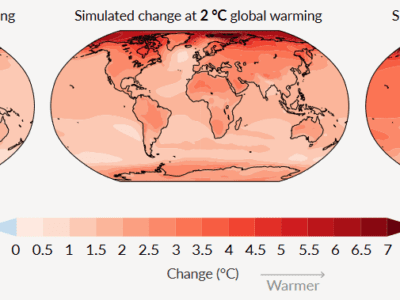Taking A Data-Driven Tour of Air Pollution Law
After Half a Century, What Do We Really Know about the Impacts of the Clean Air Act?
Earlier this year, a team of economists published a retrospective paper on the Clean Air Act. It surveys the economic literature to find out what the data tells us about emission trading systems, the effects of pollutants, and effects of imposing tougher regulatory requirements in areas that failed to meet national air quality standards. Some of the findings are not surprises: stricter regulations actually do result in improved air quality. Others are more surprising. The paper also sheds light on the present state of environmental economics.
I’ll start with what the paper tells us about environmental economics. Many people identify that discipline with cost-benefit analysis and assume that economists are opposed to regulation. They also think of economists in terms of theories based on a belief in markets. The studies described in this paper don’t fit the stereotype. The studies are all empirical, not theoretical, sometimes but not always with some economic modeling built into the data analysis. By and large, the papers support the utility of regulation. The big example seems to involve federal regulation of the renewable content of fuels, which doesn’t seem to have accomplished much (as opposed to the California version.) And none of them engage in cost-benefit analysis. Maybe environmental economists were once Milton Friedman-types, but that’s definitely not true today.
The retrospective paper is quite lengthy. I won’t try to summarize the whole thing here, but will just pick out some points I found interesting. There’s a fairly lengthy discussion of emissions trading. It concludes that emissions trading generally did produce cost reductions as advertised. It was also generally effective in reducing emissions. There’s some evidence of hot spots or of disparate impacts on minority groups or the poor, but it’s fairly limited. For instance, the much maligned RECLAIM program in Southern California cut emissions by 20% compared to firms outside the program, with all groups experiencing air pollution reductions. Blacks received greater pollution reductions than whites, but Hispanics received fewer.
The grandfather of emission trading programs is the SO2 program created by the 1990 amendments to the Clean Air Act. The evidence shows that it did achieve emissions at a lower cost than a conventional pollution regulation. However, interestingly, the cost savings were lower than expected for two reasons. First, some power plants chose to install expensive scrubbers rather than using less expensive measures such as switching to coal containing less sulfur. This may be part of a broader trend of utilities in states with regulated prices favoring big capital investments to achieve standards, because their shareholders can make a return on the investment. Second, there were essentially only two railroads shipping massive amounts of lower sulfur coal, and they took advantage of the regulations to charge more to the power plants that most needed that coal. This soaked up some of the cost-savings.
Another interesting set of findings relates to effects on employment. The studies are not entirely consistent, but some well-conducted studies do show employment decreases with most of the harm falling on older workers who lose their jobs and cannot obtain equivalent new employment. Regulations can cause job lose through direct effects on firms, or indirectly, as some employees in manufacturing lose jobs when regulations of the power sector cause increased costs to their employers. On the scale of national employment, the job losses aren’t large, but still significant for the individuals involved.
Another interesting set of findings relate to the benefits of controlling pollution. Careful studies have confirmed that reducing pollution does indeed generally reduce mortality rate. They also point to other benefits. Children who grow up in cleaner air are better off decades later when they’re in the workforce. The effect is small but significant because so many people are involved. Another study shows that air pollution can increase dementia. Both benefits are large in economic terms, again because of the number of people involved.
One things that’s notable is that the studies don’t shed much light on the impact of nationwide regulations. The reason is that there’s no control group — the whole country is impacted, so there’s no good way to compare firms or regions that are affected by the regulation with those that are not.
Reading the article surveying all those studies won’t be everyone’s cup of tea. You have to put up with a lot of references to triple difference-in-difference studies and to Poisson processes. Still, there’s a lot of meat in there worth chewing on, if you understand or are willing to ignore the technical aspects of the studies.
*A note about the paper’s timing. I’ve linked to an early version of the paper that appeared online in 2020. However, the economics publication process is arduous and probably the slowest of any academic discipline. The final paper didn’t appear in print until the March 2022 issue of the Journal of Economic Literature. I didn’t link there because it’s paywalled — you wouldn’t expect an economics journal to have free public access, would you?
Reader Comments
3 Replies to “Taking A Data-Driven Tour of Air Pollution Law”
Comments are closed.






Why Isn’t There a Mass Movement for Climate Action in the US? (BLOOMBERG 7/25/22)
“There’s this enormous political climate movement in this country, but only if it gets organized.”
https://finance.yahoo.com/news/why-isn-t-mass-movement-100017833.html
Dan, when are you people going to make the right things happen? TIME IS UP!
P.S. Dan, you might want to begin your climate change education and motivation program by explaining climate change to the President.
Mr. President, we have a climate emergency
https://www.msn.com/en-us/news/politics/mr-president-we-have-a-climate-emergency/ar-AAZZA4c?ocid=msnews
Interesting, no leaders have cared enough to educate and motivate us to survive yet, and that concludes our civilization.